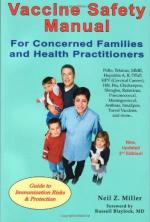|
This section contains 570 words (approx. 2 pages at 300 words per page) |

|
When a foreign agent (pathogen) enters the body, a protective system known as the immune system comes into play. This system consists of a complex network of organs and cells that can recognize the pathogen and mount an immune response against it.
Any substance capable of generating an immune response is called an antigen or an immunogen. Antigens are not the foreign bacteria or viruses themselves; they are substances such as toxins or enzymes that are produced by the microorganism. In a typical immune response, certain cells known as the antigen-presenting cells trap the antigen and present it to the immune cells (lymphocytes). The lymphocytes that have receptors specific for that antigen binds to it. The process of binding to the antigen activates the lymphocytes and they secrete a variety of cytokines that promotes the growth and maturation of other immune cells such as cytotoxic T lymphocytes. The...
|
This section contains 570 words (approx. 2 pages at 300 words per page) |

|


